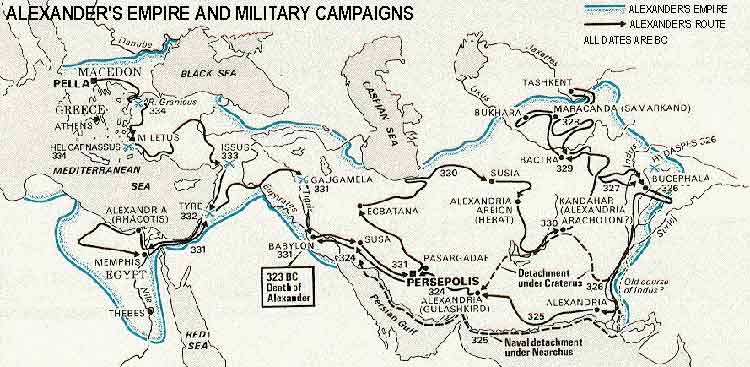356 B.C. – 323 B.C.
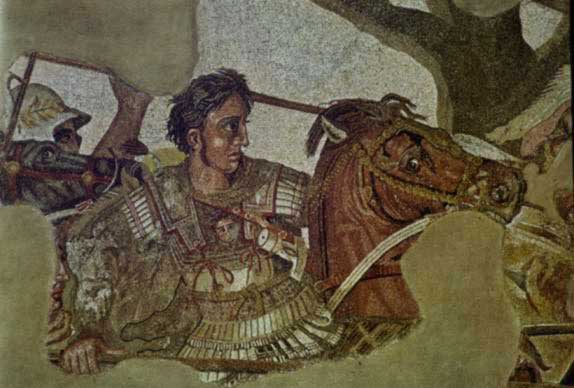
Macedonia in the 4th Century B.C.
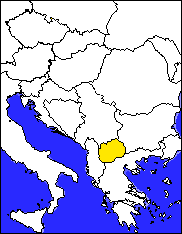
A. Environment
- Macedonia was (and is) a mountainous land consisting of mostly mountains in the north (Highlands) and some plains in the south (Lowlands).
B. The People
- Two groups of people then – The Highlanders and the Lowlanders
- The Highlanders lived in the mountains, while the Lowlanders lived on the plains.
- Both peoples were rough and rugged. The country was very poor and people lived hard lives. Pockets of nobility (in the north and south) were always fighting for control of the country, before it was unified under Philip II (Alexander’s father).
- The Highlanders identified themselves with the barbarous tribes to the north. The Lowlanders identified themselves with the Greeks below them.
- The Greeks saw all Macedonians as country bumpkins – distant (low class) relations to themselves. They grudgingly allowed Macedonians to compete in the Olympic Games, because of the Macedonian claim of being descendants of Herakles (Hercules).
Alexander’s Parents
A. Philip II
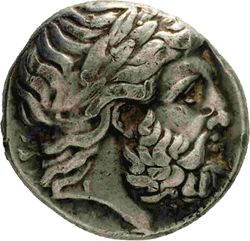
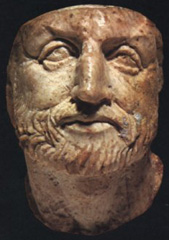
- Came from Lowland nobility. His relatives semi-ruled Macedonia. They were weak rulers who were bullied by the powerful city-states of Greece (Athens, Thebes, Sparta, etc.). They all claimed to be the descendants of Herakles.
- As a young man, his older brother gave Philip as a hostage to Thebes. While in Thebes, Philip got an education of a lifetime in warfare and Greek culture. He lived in Thebes when general Epaminondas was the head of theTheban army. Epaminondas shattered the belief that the Spartans were invincible in battle. He invented a battle formation called the Echelon, which was used to annihilate the Spartans. Philip learned about the Echelon, used it later with the Macedonian army, and taught it to Alexander. Alexander used the Echelon to devastate the Persians at the Battle of Gaugamela.
- Philip was a muscular, short man. He became lame in one leg from a wound in battle and also lost an eye.
- Philip became King in 359 B.C. with the assassination of his brother. He ruled until 336 B.C., when a former member of his personal bodyguard assassinated him. Some say it was murder done out of revenge for a personal slight Philip had inflicted on this man. Others say Olympias persuaded the bodyguard to murder Philip.
B. Olympias
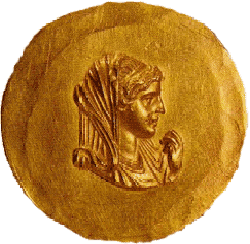
- Married Philip in 358 B.C. She came from the aristocracy of Epirus. Epirus was a country to the west of Thessaly, lying along the Adriatic.
- Their marriage helped unify Macedonia with Epirus. She was much younger than Philip – maybe by as much as 10 years.
- She practiced a strange religious cult, which involved serpents. She had pet snakes in her room and around her bed.
- She was said to be very cruel to her enemies, and enjoyed seeing their torture.
A Dysfunctional Royal Family
A.Philip, Olympias, Alexander

- Philip and Olympias took special care in raising Alexander. Philip had the best tutors teach Alexander, including the great Aristotle. Aristotle impressed Alexander thoroughly. He taught Alexander the concept of arête – which means excellence. It is the Greek concept of living one’s life to the fullest, and always striving to be the very best. Aristotle also taught Alexander science and logic.
- Alexander grew up believing in his own destiny. His father told him he was descended from Herakles, while his mother claimed he was also descended from Achilles. She also implied that Zeus (the supreme god) was really Alexander’s father, and not Philip. With a belief in his divine heritage, and a belief in arête, Alexander believed he must do (and was destined to do) miraculous things.
- Alexander preferred Olympias to Philip. There was jealousy between the two. Alexander, as a boy, worried that Philip would conquer everything before he could grow up.
- Philip was jealous of Alexander’s obvious talent, but supported his son by giving Alexander (at the age of 16) military command over part of Philip’s cavalry.
- Olympias and Philip hated each other. Philip was a womanizer and a drunkard. It was common for Macedonian men to fool around and party, so mostly Olympias didn’t mind, unless the woman was from nobility, and could therefore have a son that would threaten Alexander’s chances at inheriting the throne. Philip suspected Olympias and Alexander might be conspiring against him. He temporarily disowned Alexander, when Alexander was 19, and sent Olympias away. Philip married another woman named, Cleopatra, who was from a noble house. They had a son. Alexander’s position was now in jeopardy. By an act of “fate” Philip was assassinated the next year. Olympias killed Cleopatra and her son.
Philip’s Legacy
A. The Macedonian Military
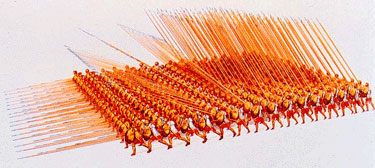
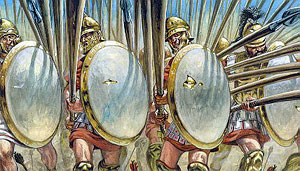
- Philip took a pathetic, ill-equipped, ill-trained army and turned it into the best fighting force of the Hellenistic Age.
- He turned his army into a professional fighting force. Their full-time jobs were to be soldiers and nothing else. He drilled them continually in different battle positions.
- He improved the Greek phalanx, a fighting force of many men grouped together in a box pattern. Phalanxes were basically human-tanks/porcupines – plowing through anything in their way. Men held a long, round shield on their left arm and a spear in their right hand. They locked shields together, and moved all at once, at the same time. This took timing and a lot of discipline. Each phalanx was about 8 rows deep and 120 columns wide.
- He invented the sarissa, a heavy spear, 18 ft. in length. Every man in the infantry (foot soldiers) used one in his phalanx.
- He was the first to used special siege equipment, including battering rams, and the first use catapults as artillery.
- He designed his army to have special functions. The heavily armed troops would be in the phalanxes. They were used primarily for defense instead of attack. The lightly armed troops were in the rear for fast raids. Heavily armed cavalry were used for smashing into the enemy. Lightly armed cavalry were used for lightning-fast raids and for reconnaissance (spying on the enemy on horse from afar). He also used bowmen and sappers (siege specialists).
- After conquering tribes in the west and north of Macedonia, he went south with Alexander and conquered Greece. Alexander led Philip’s elite cavalry.
- After conquering Greece, Philip established the Hellenic League – based in the city-state of Corinth. This was a league of allied city-states. Its purpose was to defend Greece from outside invaders and for the funding of men, weapons and money toward the military expedition against the Persian Empire. Phillip (and later Alexander) justified the war against Persia by claiming it would be a war of revenge for what the Persian Empire had done to the Greeks during the Persian Wars. Just as Philip was preparing to go, he was assassinated at a celebration to commemorate the expedition and to celebrate his daughter’s upcoming wedding.
- Upon Philip’s death, Alexander inherited all that his father created – including the most organized, best trained, fighting force the world had yet seen.

Alexander
A. Appearance, Habits and Personality
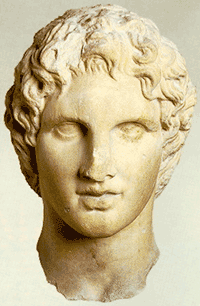
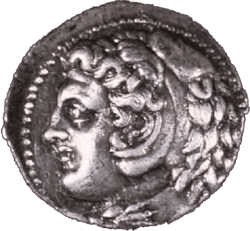
- He was said to be very handsome. He was short, even in Macedonian standards. He was fair-skinned with gray eyes and dark blond wavy hair. He was said to be very muscular, and a fast runner – fast enough to compete in the Olympic games, had he wished.
- As a young man he drank very little alcohol, and partied rarely (very unusual for a Macedonian then). Later on in life this would change and he drank too much.
- He loved sports and enjoyed physical fitness and horse riding.
- He was very serious and studied intently.
- He was hot-tempered and stubborn. Occasionally, he lost control of his temper (especially when drunk) and even killed a friend who had once saved his life, because his friend argued with Alexander about Alexander’s pretensions of being a god.
- He was very brash (and lucky). He personally fought in all the battles he was in, and received many serious wounds. These wounds were believed to have contributed to his succumbing to a fever and dying in 323 B.C. He was only 32 when he died.
B. Improvements to the Military

- Basically, Alexander used everything his father created, but was a great strategist.
- His most famous military innovation was how he used the Echelon, invented by the Theban general, Epaminondas. Alexander used the Echelon to suck an enemy in so that it could be out-flanked (surrounded). Basically, he positioned his phalanxes at a 45-degree angle, sloping up to the left. On the left flank, (side) he placed light cavalry that would repeatedly charge the enemy to keep the enemy from out flanking his army. On the far right flank, Alexander placed heavy cavalry. The heavy cavalry would make a tremendous effort to smash through an enemy’s line and then veer left, smashing into the enemy’s flank. This invariably caused a gap in the center of the enemy’s line, which Alexander’s phalanxes and light troops would rush into. The enemy’s army was thus split in two, and severely weakened. Apparently the Echelon was extremely effective, because Alexander used it against King Darius III (the king of the Persian empire) at the Battle of Gaugamela to defeat a huge Persian force, far larger than his own army.
Alexander’s Legacy
A. His Conquests Changed the Ancient World

- Wherever Alexander went, he established Greek cities. This spread Greek culture, art, religion, and ideas. His most famous city was Alexandria on the Mediterranean coast of Egypt. Alexandria became the center for intellectual learning in the ancient world. It still thrives today.
- In the Hellenistic age, all the peoples Alexander conquered became exposed to Greek culture. However, it was a time when MANY cultures and ideas were spread. It brought the ancient world closer together. Not only did the Greeks influence others, but these other people also influenced the Greeks. The ancient world became less isolated and more multicultural.
- After Alexander’s death, his generals controlled parts of his former empire. They controlled these lands until the coming of the Romans.
Sapere Aude! Critique the following statement: Alexander the Great was justified in waging war against the Persian Empire. Back up your opinion with detailed, clear logic.
But that’s another story, soon to be told.
